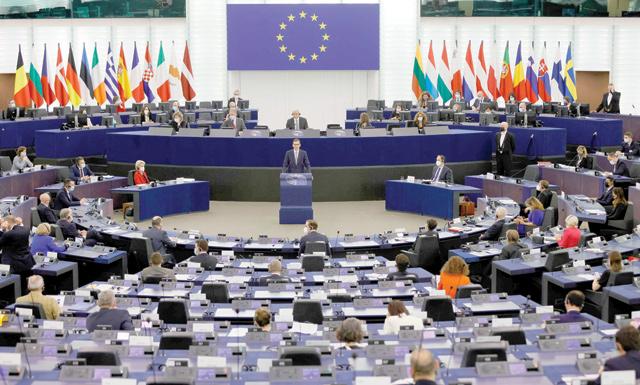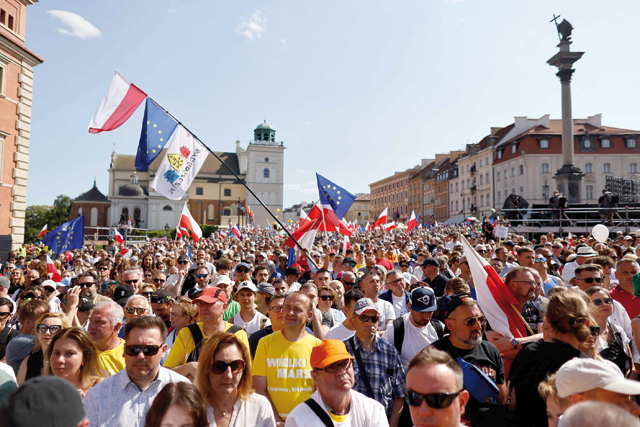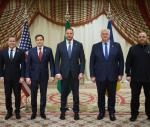You are here
Polish PM accuses EU of 'blackmail' in clash over bloc's laws
By AFP - Oct 19,2021 - Last updated at Oct 19,2021

Polish Prime Minister Mateusz Morawiecki (centre) delivers a speech during a debate on the rule of law crisis in Poland and the primacy of EU law at the European Parliament in Strasbourg, on Tuesday (AFP photo)
STRASBOURG, France — Polish Prime Minister Mateusz Morawiecki accused the EU of "blackmail" on Tuesday in a public clash with European Commission chief Ursula von der Leyen over his country's rejection of parts of EU law.
The ferocious row, played out in the European Parliament, underlined the seriousness of the issue which both Brussels and Warsaw say threatens the cohesion of the 27-nation bloc.
Von der Leyen, speaking just before and after Morawiecki took the podium, warned that her Commission, tasked as guardian of the EU treaties, "will act" to rein in Poland.
She said a controversial October 7 ruling by Poland's Consitutional Court challenging the primacy of EU law was an attempt "to take an axe to the European treaties by undermining their legitimacy".
"Undermining any of these essential pillars puts our European democracy at risk. We cannot let this happen. We will not let this happen," she said.
Von der Leyen spoke of a number of legal, financial and political options being considered, adding that "the rule of law and the treaties of the European Union are to be defended with all instruments at our disposal".
Morawiecki, in a long speech, hit back by saying "I will not have EU politicians blackmail Poland".
Dismissing MEPs' assertions that Poland had taken a step towards leaving the EU with the ruling, he insisted his country's place was firmly in the bloc.
Instead, he argued there was a "fundamental misunderstanding" in that EU law derived from its treaties could only be applied in specified areas, and Poland's constitution was supreme in all other aspects.
He suggested the rule of law issue was being used as a "pretext" by Brussels to force Poland into line.
The duel in the parliament brought to a head tensions between the European Commission and Warsaw that have been festering for years.
The Commission has taken Warsaw to task for moves to scrap judges' independence and other policies seen as rolling back democratic norms.
The EU executive and MEPs have also criticised Poland for ultraconservative social policies pushed by the ruling Law and Justice (PiS) Party that restrict LGBTQ rights and place a near-total ban on abortions.
One of the measures the Commission could use against Poland is withholding recovery cash from a pooled EU fund set up for the bloc to bounce back from the impact of the coronavirus pandemic.
Poland’s plan, asking for 24 billion euros ($28 billion) in grants and 12 billion euros in cheap loans, is still being weighed, with the Commission saying approval would come with strings attached.
Von der Leyen hinted that the issue could eventually find its way to the European Court of Justice, warning: “We have never yet lost a court case on rule of law.”
Poland, though, has the power to play spoiler in several key EU policy areas that require unanimity among the 27 countries, among them migration and fighting climate change.
It also has the support of Hungary, another bete noire for Brussels seen to be flouting rule of law.
The leaders of the EU are to hold a summit in Brussels on Thursday and Friday. The wrangling over Poland could move up its agenda, with The Netherlands and Luxembourg especially critical of Warsaw.
As he went into a preparatory meeting of EU European affairs ministers on Tuesday, Luxembourg’s Foreign Minister Jean Asselborn told AFP: “Europe will not survive if rule of law falls. That’s very clear.”
The EU justice commissioner, Didier Reynders, also attending, said the Commission was “very concerned” about the row with Poland.
“We will continue to debate the [Polish recovery] plan,” he said, linking it to Poland’s judicial reforms.
“There must be both investments and reforms, and these reforms go to the independence of the courts, and so we are waiting for a very clear message on this topic,” he said.
Related Articles
BRUSSELS — European Union leaders clashed at the start of a summit on Thursday over the bloc's plans to tackle climate change, arguing over
LUXEMBOURG — The Court of Justice of the European Union on Monday ruled that a controversial Polish judicial reform from 2019, which notably
BRUSSELS — The UK government has written to EU chief Ursula von der Leyen to say it will not nominate a British member to her top team befor

















